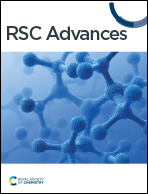Freezing-enhanced chlorination of organic pollutants for water treatment†
Abstract
Freezing has been reported to accelerate chemical reactions and thus affect the fate of pollutants in the environment. However, little research has been conducted on the potential effects of freezing on the chlorination process. This study aimed to explore the freezing-enhanced chlorination process by comparing the oxidation of clofibric acid (CA) by chlorine in ice (at −20 °C) to the same reaction in water (at 25 °C). The degradation of CA, which was negligible in water, was significantly accelerated in ice. This acceleration can be attributed to the freeze concentration effect that occurs during freezing, which excludes solutes such as chlorine, CA and protons from the ice crystals, leading to their accumulated concentration in the liquid brine. The increased concentration of chlorine and protons in the liquid brine leads to higher rates of CA oxidation, supporting the freeze concentration effect as the underlying cause for the accelerated chlorination of CA in ice. Moreover, the chlorine/freezing system was also effective in the degradation of other organic pollutants. This highlights the environmental relevance and significance of freezing-enhanced chlorination in cold regions, particularly for the treatment of organic contaminants.



 Please wait while we load your content...
Please wait while we load your content...